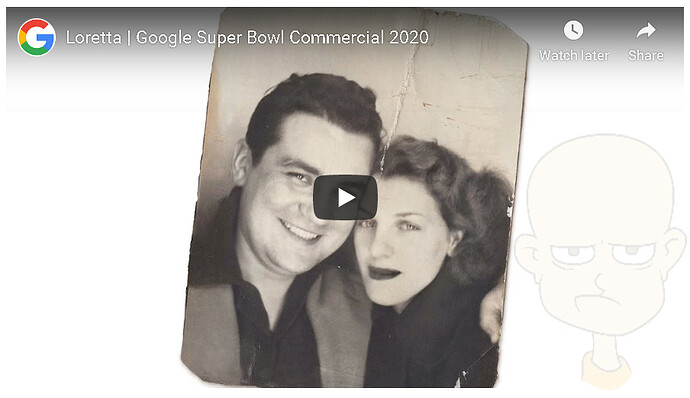“I had an uneasy feeling about the Google commercial,” writes Larry Magid in his column for the San Jose Mercury News . “But I couldn’t put it into words until I read a blog post from tech strategic adviser Shelly Palmer.”
In the post Palmer describes Google’s Super Bowl ad as “a three-hanky, heart-tugging spot that has us eavesdropping on an elderly widower hoping that Google Assistant will help him remember the highlights of his life with his late wife.”
The ad is beautiful, poignant, thoughtful, sentimental, informative and… evil. It may be the most evil advertisement I’ve ever seen. What Google doesn’t tell you about the service is what it will do with all of the extra data this widower has given it: how much better it will be able to target him, who they will be able to “sell” him to, etc., all without any warning. The service is “free” — not because the widower is the “product” that Google is selling, but because this man is a worker in the mines of Google.
Where is the product labeling? Where is the disclaimer that when you tell Google Assistant everything about the best parts of your life, the algorithm enriches your profile and Google becomes more profitable at your expense?
None of this would bother me if the ad had a disclaimer, or if the ad started with a younger relative adjusting the widower’s privacy settings in advance of his experience. This was an ad designed to make people who have no idea what Google does for a living (or how Google works) give Google their private data.
I don’t remember a non-political television commercial making me this angry — ever. Shame on you, Google, for this invidious attack on the uninitiated. They deserve better from you. We all do!
The ad has now also been viewed over 37 million times on YouTube. The San Jose Mercury News columnist calls it “another indication of the conflicting emotions I have when it comes to what tech companies know about us.”
I love that I can use Google to bring up important moments in my life, but I hate that this information is being stored in servers and being used to serve me ads, even though I admit that — if I have to look at ads — I prefer those that are relevant to those that I’m completely uninterested in. So, to borrow a word from this commercial, “remember” that free services like Google and Facebook aren’t completely free. We pay with our information, our attention and — depending on how the information is used — our privacy.
Ironically, the columnist is CEO of a non-profit internet safety group that “receives financial support from Google, Facebook and other tech companies.”
